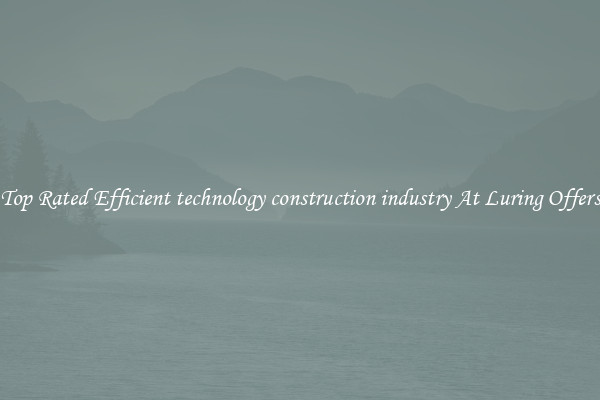Top Rated Efficient technology construction industry At Luring Offers
In today's fast-paced world, the construction industry is constantly evolving and adapting to new technologies. With the growing demand for more sustainable and efficient construction methods, companies in the industry are now investing in top-rated efficient technology to stay ahead of the competition and attract lucrative offers.

Efficient technology in construction refers to the use of advanced tools, machinery, and software that streamline processes and enhance productivity. These innovative solutions enable companies to complete projects faster, enhance safety standards, and reduce costs, making them highly sought after in the industry.
One of the top-rated efficient technologies in the construction industry is Building Information Modeling (BIM). BIM is a digital representation of a building's physical and functional characteristics that provides architects, engineers, and construction professionals with a comprehensive understanding of the project. This technology allows for better coordination and collaboration among team members, minimizing errors and rework, and ultimately saving time and money.
Another efficient technology widely adopted in the construction industry is prefabrication. By manufacturing components off-site and assembling them on-site, companies can significantly reduce construction time and labor costs. Prefabrication also reduces waste, improves quality control, and ensures better energy efficiency in buildings.
The use of drones in construction has also revolutionized the industry. Drones equipped with cameras and sensors can capture high-resolution images and precise data, providing valuable insights on project progress, site inspections, and safety monitoring. This technology allows professionals to make informed decisions and address issues promptly, saving time and resources.
Virtual Reality (VR) and Augmented Reality (AR) have also gained popularity in the construction industry. VR enables stakeholders to experience a virtual walkthrough of a building before it is constructed, allowing for better design adjustments and client presentations. AR, on the other hand, overlays digital information onto the real world, facilitating on-site decision-making and enhancing worker productivity.
Efficient technology in construction not only benefits companies but also addresses the pressing need for sustainability. Green building materials, energy-efficient designs, and renewable energy systems are all part of the efficient technology solutions available in the market. With increasing emphasis on sustainability, companies investing in these technologies are more likely to attract offers from environmentally conscious clients and investors.
In conclusion, the construction industry is embracing top-rated efficient technology to stay competitive and attract lucrative offers. Building Information Modeling, prefabrication, drones, virtual reality, and augmented reality are just a few examples of the innovative solutions transforming the industry. By adopting these technologies, construction companies can significantly improve project outcomes, enhance sustainability, and ultimately secure higher-value projects.

View details

View details

View details

View details








